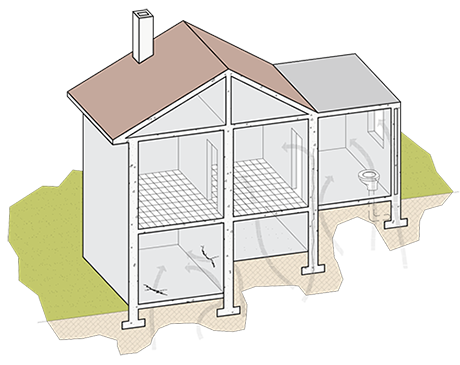Penalties for Non-Compliance
Failure to comply with radon monitoring and remediation obligations in the workplace exposes the employer to severe financial penalties and, in more serious cases, criminal sanctions. In…
Offerte a tempo e soggette a disponibilità limitata

Select your province and municipality in Sardinia to view the probability of exceeding the indoor radon concentration level of 300 Bq/m³.
Radon is a naturally occurring radioactive gas that is colorless, odorless, and tasteless. It forms from the decay of uranium in soil, rocks, and water. It can enter buildings through cracks in floors, foundations, or walls.
Radon is dangerous because prolonged inhalation of high levels increases the risk of developing lung cancer. It is the second leading cause of lung cancer after smoking.
The only way to know if radon is present in your home is to conduct a detection test. The test can be done using short- or long-term devices, which are easily available, or by hiring specialized professionals.
Radon is more commonly found in areas with uranium-rich soil, such as mountainous or rocky regions. However, radon levels can vary between individual buildings, regardless of the geographic area.
Radon exposure does not cause immediate symptoms, but long-term exposure increases the risk of developing lung cancer. Since there are no specific symptoms, regular monitoring of indoor radon levels is essential.
The World Health Organization (WHO) recommends keeping radon concentrations below 100 Bq/m³ (becquerels per cubic meter). Levels above this threshold indicate the need for remediation.
There are several solutions to reduce radon levels, such as improving home ventilation, sealing cracks in floors and walls, and installing radon extraction systems. A qualified technician can recommend the most suitable intervention.
The cost of a radon test depends on the type of device used (short-term or long-term test). Contact us for a free quote.
If radon levels exceed safety limits, it is crucial to carry out remediation measures. These interventions aim to reduce radon infiltration, such as installing ventilation systems or adopting other decontamination techniques.
Yes, preventive measures can be taken during construction, such as installing sub-floor ventilation systems, using construction materials that reduce radon entry, and sealing cracks and gaps.
Failure to comply with radon monitoring and remediation obligations in the workplace exposes the employer to severe financial penalties and, in more serious cases, criminal sanctions. In…
The Region of Sardinia has identified 162 municipalities as priority areas for radon monitoring, in accordance with Legislative Decree No. 101/2020. This classification was officially published in the Official Gazette on October 14, 2022, and is…
Radon is a naturally occurring radioactive gas, colorless and odorless, formed by the decay of uranium present in soil and rocks. Although it is a natural element, its accumulation in enclosed spaces…
Starting January 1, 2025, new regulations for radon gas control will come into effect in Italy. These provisions, introduced by Legislative Decree No. 101 of July 31, 2020, set stricter standards for newly constructed…

Radon – Sardegna is a network of leading professionals in the radon sector, committed to providing high-quality measurement and mitigation services. Our certified experts undergo continuous training to ensure excellent solutions.